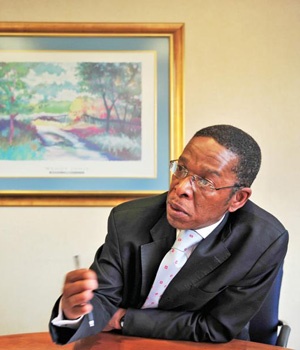
Thembani Bukula, the head of electricity regulation at the National Energy Regulator of SA (Nersa), says the controversial and expensive nuclear deal South Africa is looking at to power the country will go through a competitive bidding process to ensure efficiency in electricity supply.
Bukula’s comments come just two weeks after ANC MP and chairperson of Parliament’s portfolio committee on energy Fikile Majola said Parliament would not just rubber-stamp the deal if it turned out to be unaffordable or detrimental to the country.
Bukula said Nersa was keeping a close eye on the possible nuclear deal, which has seen the country enter into discussions with Russia, raising concerns that the former Soviet superpower is the preferred nuclear energy supplier and that this is not giving other foreign nuclear companies a fair chance.
Nersa agrees with Energy Minister Tina Joemat-Pettersson about the need to explore the feasibility of nuclear generation, as contained in the National Development Plan, but it wants competitive pricing to be factored in.
“The next stage is when we have concurrence about the range of prices that this would come at, and that stage has not happened. In the National Energy Regulator Act, the only entity that regulates the electricity prices is Nersa, so there would be a competitive bidding process,” Bukula told City Press this week.
“If it’s a competitive bidding process, then the pricing would be there, but generally we’re involved in the process of ensuring that whatever is obtained is obtained in a manner that would ensure efficiency and competitiveness, as section 34 of the act requires.”
The country’s interest in nuclear energy is driven by the failure of Eskom’s coal-fired power stations to keep the country powered and meet the future projected demand for power in the country.
Bukula said electricity consumers could expect drastically lower tariff price increases once the two new power stations – Medupi and Kusile – were fully operational.
“Generally and around the world, during the building phase, you would have that upward movement in prices and, once you’ve built, you normally stabilise. We are just at this phase of building.
“Once we’ve built, prices should stabilise. Ideally, once you get your prices to that level, you don’t want to drop them and then, when the time comes to build, you pump them up again – you’d rather keep them level so that when you have to build, it is not a big step that you have to take in acquiring the funds and ensuring you have enough retained earnings to ensure that you carry on that build. But these are policy issues,” said Bukula.
He is as uncompromising on Eskom’s inefficiencies in managing power supply as he is about consumers who do not actively manage their consumption, but admits the costs have now ballooned to being among the highest in the world.
Nersa eventually granted Eskom only 8% for tariff increases because the utility was not performing well.
“This particular decision was based on the fact that the amount of money Eskom was given had assumed that Medupi’s Unit 6 would have been onstream and we would have been looking at Unit 5 to come on. We had also set performance standards for Eskom as per its application that it would have the plant available at least at the level of around 82%, and would be allowed a close to 12% [tariff increase] for maintenance.
“We set the prices and performance standards, and that’s the part that gets forgotten by Eskom – it’s not their standards they must perform to, it’s the standards we set for them, as required by law. When they are not meeting those standards, they’re not entitled to increases,” said Bukula.
When he joined Nersa in 2006, South Africa’s electricity costs were among the lowest in the world, at 16c per kilowatt-hour. Almost 10 years later, electricity prices are at an average of 80c/kWh, with most industrial, commercial and domestic consumers paying between R1 and R1.20/kWh.
Back then, tariff increases were linked to inflation and consumers rarely complained about high costs, but Nersa was forced to approve increases of 14% and 27% in 2009.
Bukula said South Africans would have to learn to manage their consumption if load shedding and high costs were to be dealt with.
“Up until recently, I don’t think consumers had a level of confidence in our pronouncements that they would just listen to what we say. For a long time, the entity that has been communicating with consumers on consumption has been Eskom, and there’s a strategy around that.
“But the day there’s no load shedding, we all go back to our bad habits. The next tool that we have is your price. Maybe when you make it pinch, people react.
“Studies have shown that humans are not as rational as we’d expect them to be when it comes to making rational decisions on price. So the next thing is in technology: innovating our things in our homes to switch on and off. The problem with electricity is that it’s invisible. We have no clue what we’re consuming.”
Bukula, who obtained his BSc engineering degree from the University of Natal and a postgraduate diploma in engineering business management from Warwick University, said South Africans needed to change their behaviour regarding energy consumption.
“Energy efficiency is a culture that we need to inculcate in people. But we don’t have that culture. That’s what we need to focus on as a country because people are not active managers of their electricity consumption.
“If you look at Kuwait, they have a lot of money. But it’s not about whether people can pay or not; they started looking at it because they wanted to use resources efficiently. South Korea, on the other hand, went for the most energy-efficient home appliances,” said Bukula.




 Publications
Publications
 Partners
Partners








